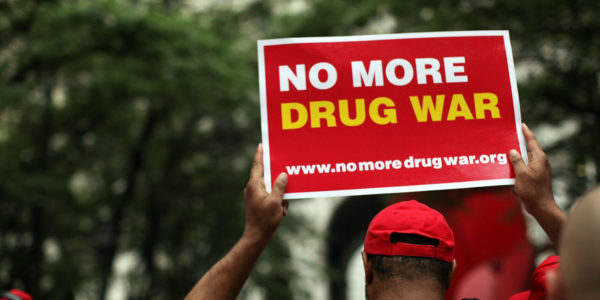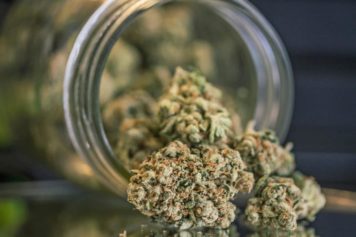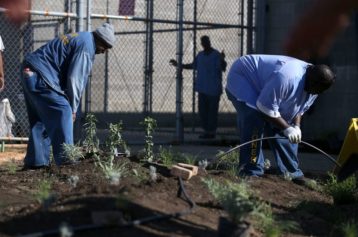
NEW YORK, NY – JUNE 13: Marijuana legalization advocates and members of community groups attend a rally against marijuana arrests in front of One Police Plaza on June 13, 2012 in New York City. The New York City Council is set to vote on a resolution that would decriminalize possession of small amounts of marijuana in public view. New York Gov. Andrew Cuomo has urged the state’s lawmakers to pass the law which many say leads to the arrests of a disproportion of minority youths. (Photo by Spencer Platt/Getty Images)
America is in an uncivil slugfest over weed. In one corner sits the gigantic-yet-aging federal government peering menacingly across a smoky ring, its once-powerful demeanor sagging from the cumulative jabs of its smaller hard-to-hit foe. Just after the New Year, this plodding behemoth threw a threatening right hook in the form of a Justice Department memo aimed at rolling back Obama-era deprioritizing of marijuana prosecutions and letting its opponent know it can still pack a punch. In it, Attorney General Jeff Sessions stated, “Previous nationwide guidance specific to marijuana enforcement is unnecessary and is rescinded, effective immediately.”
In the other corner, its sleek and flexible states challenger confidently gleams back, doubting the remaining power of its federal opponent and fairly certain the giant has exhausted its best shot. The past year was a good one for the challenger, as a total of 29 states have now legalized medical marijuana, and eight states, in addition to Washington, D.C., Puerto Rico and Guam, have acted to legalize recreational use. A dozen more are considering some form of legalization in 2018, and a recent Gallup poll has a record-high 64 percent of Americans favoring legalization nationwide.
While it may be a slight overstatement to suggest the feds are on the ropes, some believe the states, at the very least, are counterpunching effectively and winning rounds. “States are pushing back against what Jeff Sessions is saying, and what’s really exciting and giving us hope is that we are now going to address this at the root,” said Shanita Penny, president of the Minority Cannabis Business Association (MCBA), a not-for-profit advocacy group. In 2015, Penny founded the cannabis industry consulting firm Budding Solutions. Ending federal prohibition is the way forward, said Penny, noting that “we’ve been putting a band-aid on it by protecting states’ rights and not funding the DEA, but we absolutely have to address it at the federal level. So this is something we’ve always needed to do.”
The states are confidently downplaying Sessions’ recent statement. “We’ll give Jeff Sessions our legal pot when he pries it from our warm, extremely interesting to look at hands,” tweeted Democrats in Colorado’s State Senate in response to the Jan. 4 memo. And Sal Pace, a county commissioner in Colorado, stated, “Any move by the DOJ to reverse cannabis legalization enacted by citizens across the country will be opposed vigorously by a bipartisan national coalition of local elected officials.”
Even so, as an African-American, Penny is well aware that the primary casualties in the ongoing war over weed have been, and likely will continue to be, the same color as her.
“Historically, we have been targeted and over-policed,” she acknowledged, clarifying that “our community, as a whole, has been the target of the drug war. So what you’ve seen in places like Colorado, where cannabis is legal, marijuana possession arrests are up and they continue to increase for Black and brown people.” Penny described how African-Americans and the Latinx community represent the “low-hanging fruit” for law enforcement in compliance raids, those “Black and brown people in this industry that are typically on the front lines working in a cultivation operation, dispensary or retail operation. If the DEA raids that facility, those are the people that will be jailed immediately, whose entire livelihoods will be at risk.”
Penny pointed to a December 15 raid by Denver police on Sweet Leaf dispensaries in Colorado where 13 employees at multiple locations were arrested on a legally-vague interpretation of noncompliance, yet the owners of the chain were not. While those arrested and charged included individuals of all races, her larger point is how, going forward, these front lines workers — positions African-Americans and the Latinx community are more likely to assume — will be immediately criminalized while owners are barely mentioned publicly, if at all. And unlike these commonly white and affluent owners, said Penny, the workers “don’t have an arsenal of lawyers and legal resources to avoid jail time or prison sentences when the hammer falls.”
“Pot is the reason behind mass incarceration, pot is behind the drug war in this country,” offered Wanda James, to Westword magazine. Owner of Denver’s Simply Pure dispensary, James is the first African-American woman to open a dispensary in Colorado. “That’s what fills our jails,” said James, noting that’s what “all of this is about” and further characterizing it as “a civil rights battle.”
Consistently, the ACLU has reported, despite the changing national climate, that African-Americans are almost four times more likely to be arrested for possession of marijuana than white people given similar rates of drug use. And recent studies from several states including New Jersey, New York and Virginia revealed that African-Americans are still far more likely than whites to be arrested on marijuana charges. “It raises deep concerns when we’re seeing that the racial disparities have actually deepened in the areas of drug possession, law enforcement and other areas,” said Hilary O. Shelton, director of the NAACP’s Washington Bureau and senior vice president for advocacy and policy. “With young people of all races and ethnicities, according to the Department of Health and Human Services, illegal drug use is consistent across racial and ethnic lines,” reported Shelton, noting “the problem boils down to the practices of the criminal justice system itself.”
Given such racially skewed dynamics affecting the industry, Penny is focused on building effective coalitions between all of the relevant parties, be they white dispensary owners or front-line African-American and Latinx workers. “Typically, it will affect someone that’s not in your circle and, at that point, we will demand that the industry stands behind the folks impacted by this,” said Penny, noting the need for wealthy industry owners to support rank-and-file growers and workers. “We are actively pursuing legalization models that incorporate a race equity principle,” stressed Penny. “That’s our strategy for ensuring that the racist history of marijuana policy is not perpetuated beyond prohibition.”
Along with building coalitions, the MCBA is actively supporting proposed and existing legislation on Capitol Hill preserving medicinal marijuana use and ending prohibition nationally. Later this month, Congress will determine whether to continue the Rohrabacher-Farr amendment, the law prohibiting the Justice Department from prosecuting medical marijuana users and sellers operating legally under state laws. Sessions has been lobbying federal legislators to allow the amendment to expire. “This would give the attorney general a blank check to go after medical marijuana,” Sarah Trumble, of the marijuana advocacy think tank Third Way, told the Los Angeles Times.
However, U.S. Senator Cory Booker (D-N.J.) has sponsored the farthest-reaching bill yet, that, if adopted, would thwart Sessions’ efforts and legalize marijuana nationwide. “You’ve got Senator Cory Booker and the marijuana justice act that not only ends prohibition but addresses the ills of the drug war,” said Penny, noting that unlike other legislation pushing legalization, Booker’s bill addresses racial disparities as well. “The Minority Cannabis Business Association has endorsed Senator Booker’s bill, and we intend to put on a full court press this year as we move toward legalization.”
But regardless of what happens at the federal level, the American people and the pro-marijuana majority of states they reside in clearly have the momentum in a 21st century war fought not just over land or territory, but what can grow upon it.
“I am optimistic about marijuana in this country,” said Penny, despite the current federal barriers and ongoing racial disparities. Penny predicts a brighter future “as we educate and bring awareness to the opportunities this industry is creating and build a network of minorities that are going to be successful and pave the way for a lot more participation.”


